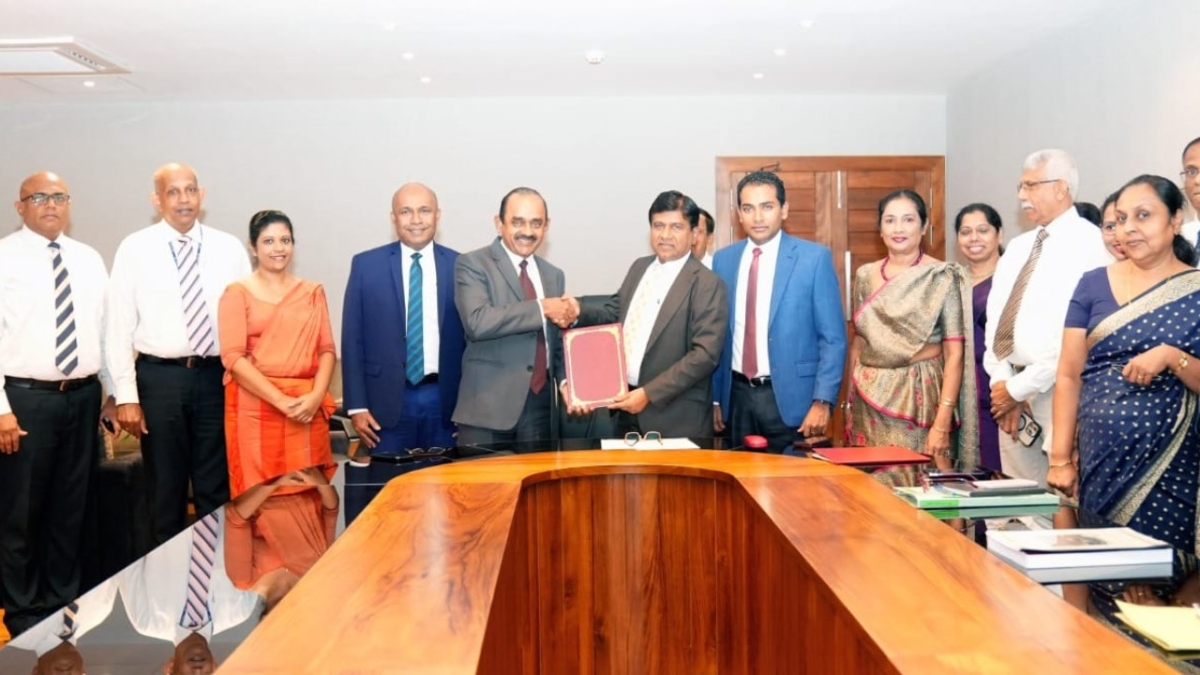In a groundbreaking move towards modernization and convenience, Peoples Bank has proudly announced the successful implementation of a cutting-edge payment acceptance solution for the Ministry of Justice. This transformative initiative allows the public to pay fines imposed by courts seamlessly through digital payment methods such as Credit Cards and Debit Cards.
The Memorandum of Understanding (MOU) that solidified this innovative collaboration was signed on November 30th, 2023, during a ceremony held at the Ministry premises. The esteemed signatories were the Secretary to the ministry Mrs. Wasantha Perera, and the CEO/GM of People’s Bank Mr. Clive Fonseka. The event was attended by the Minister of Justice, Prisons Affairs and Constitutional Reforms Hon. (Dr.) Wijeyadasa Rajapakshe PC, the State Minister Hon. Anuradha Jayarathne and People’s Bank Chairman Mr. Sujeewa Rajapakse.
This collaboration between People’s Bank and the Ministry of Justice signifies a major leap forward in the realms of efficiency, transparency, and public service. The implementation of this digital payment solution aims to address the growing need for streamlined and user-friendly processes in the legal sphere, making the payment of fines a hassle-free experience for the public.
Key Features of the new payment solution:
- Digital Convenience: Individuals can now settle their court fines instantly and conveniently without carrying cash, using popular digital payment methods such as Credit and Debit Cards.
- Enhanced Transparency: The new system ensures transparency throughout the payment acceptance process.
- Efficiency: By leveraging digital channels, the payment solution significantly reduces the processing time for fine payments, contributing to a more efficient justice system.
- Secure Transactions: All transactions are highly secure, thus safeguarding sensitive financial information.
Minister Hon. (Dr.) Wijeyadasa Rajapakshe, speaking at the event said “We have ambitious plans to leverage on the latest technology to offer maximum convenience to the public when they interact with the judicial system. This collaboration with People’s Bank is a testament to that commitment and we have several similar initiatives that we hope to implement soon. We are also planning to introduce a redesigned space in courts to offer greater comfort to witnesses.”
People’s Bank Chairman Mr. Sujeewa Rajapakse commented “Government institutions adopting the latest technology such as these have enabled citizens to experience a higher level of convenience when interacting with government services. The availability of payment options has led to shorter queues at physical payment centers, reducing wait times and enhancing overall service satisfaction. The success of People’s Bank's collaborative effort with government entities serves as a model for future partnerships and exemplifies the potential of synergy between financial institutions and the public sector.”
The Ministry Secretary Mrs. Wasantha Perera stated “After implementation of POS machines at courts to enable the public to make payments via Credit & Debit Cards, there are plans underway to enable online payments and QR code payment facilities for greater convenience of the public. This collaborative effort between Peoples Bank and the Ministry will ensure a more efficient fund management encouraging citizens to fulfill their financial obligations promptly”.
Commenting on the bank’s role in introducing this value addition, People’s Bank CEO/GM Mr. Clive Fonseka said “Peoples Bank, known for its innovative digital banking solutions, has embarked on a mission to transform the way government manages payments. By leveraging its expertise in financial technology, the bank has joined forces with multiple government entities to establish fast, secure, and user-friendly payment acceptance systems. This is yet another example of that drive which aims to enable citizens to conveniently pay taxes, fines, fees, and other payments using multiple payment methods”.
Automated payment acceptance systems significantly reduce the administrative burden on government staff. With payments processed electronically, manual cash handling, data entry, and reconciliation tasks have been minimized, freeing up valuable time and resources for more important tasks. In addition, the digital payment ecosystem generates valuable data insights that can be leveraged for informed decision-making. Governments can analyze payment trends, peak transaction times, and preferred payment methods to optimize their service delivery strategies.
Established under the People’s Bank Act No 29 of 1961, People’s Bank is the country’s second-largest financial services provider with close to LKR 3.0 trillion in consolidated assets. At present, the Bank has 747 branches and service centres located islandwide and over 14.7 million customers. People’s Bank has 290 SBUs comprised of ATMs, CDMs, and CRM, allowing customers to bank at their convenience 24/7, 365 days a year.




